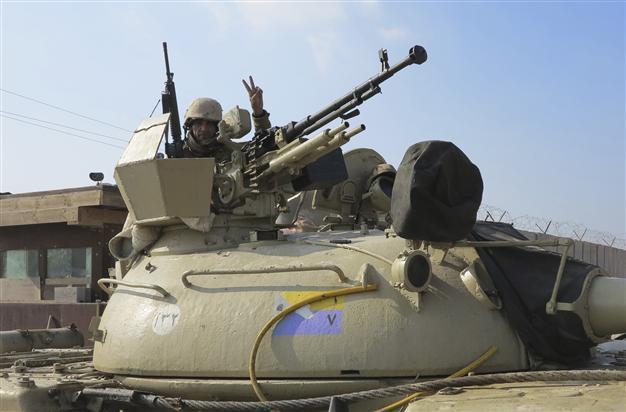Iraqi forces assault gunmen in crisis-hit city
RAMADI, Iraq - Agence France-Presse

An Iraqi soldier gestures from a tank during an intensive security deployment on the streets of Ramadi January 18, 2014. REUTERS Photo
Iraqi forces launched a major assault Sunday on a Sunni Arab city partially in the control of anti-government fighters in a bid to end a weeks-long crisis ahead of elections.The operation, which involved police, pro-government militiamen and SWAT forces, sought to wrest back key neighbourhoods of Ramadi, the capital of Anbar province and one of two cities where the authorities lost vast swathes of territory about three weeks ago.
It came as Jordan said it would host a US training programme for Iraqi forces grappling with the country's worst bloodshed since 2008 and the ongoing standoff in Anbar, which, combined, have left more than 650 people dead this month.
Diplomats including UN chief Ban Ki-moon have urged Baghdad to pursue political reconciliation to undercut support for militancy.
But with an election looming in April, Iraqi premier Nuri al-Maliki has blamed "diabolical" Arab countries for the unrest and focused on security operations.
Iraqi forces backed by tribesmen moved into five Ramadi neighbourhoods Sunday, with helicopters providing cover and firing on the sprawling district of Malaab at the centre of fighting between anti-government fighters and security forces and their tribal allies.
"The Iraqi army launched a large operation with helicopter cover against Daash, Al-Qaeda and terrorists in Ramadi," defence ministry spokesman Staff Lieutenant General Mohammed al-Askari said, according to state television, employing terms frequently used by the Iraqi security forces to describe militants.
Security forces barred movement in the city as part of the operation, which targeted neighbourhoods in the south and centre of Ramadi.
The operation will seek to take back momentum from anti-government fighters, who have expanded their hold on Ramadi in the past week after police and allied tribesmen trumpeted gains there this month.
It follows an operation mounted by elite forces in the largely rural area of Albubali that security officials have described as a militant stronghold.
Troops there have been held back, however, by the threat of snipers and anti-aircraft weapons, as well as poor weather that has limited movement.
A large section of Ramadi and all of Fallujah, both former insurgent bastions close to Baghdad, fell from government control late last month.
It was the first time anti-government fighters have exercised such open control in major cities since the height of the insurgency that followed the US-led invasion of 2003.
Fighting originally erupted in the Ramadi area on December 30, when security forces cleared a year-old Sunni Arab protest camp.
It spread to Fallujah, and militants moved in and seized the city and parts of Ramadi after security forces withdrew.
Maliki on Sunday blamed "diabolical" and "treacherous" Arab countries for supporting the unrest, and insisted he was "confident that the Iraqi people will defeat terrorism".
"The world has united with us," he said in a speech in the southern city of Nasiriyah. "The (UN) Security Council, the European Union, and most Arab countries, except some diabolical treacherous countries." He did not single out specific countries, but Iraqi officials have alleged Saudi Arabia and Qatar in particular have supported disaffected Sunni Arabs in western Iraq as they have staged anti-government protests in the past year.
Amman meanwhile said on Sunday it would host US training for Iraqi forces, after an American defence official said Washington was waiting for an agreement with Jordan or another country to go ahead with the programme.
Maliki told The Washington Post in an interview published on Thursday that Baghdad specifically needed US "counter-terrorism" training.
The US defence official said Washington was also preparing to ship "several thousand" M-16 and M-4 assault rifles as well as ammunition to Iraq, after having already provided missiles to Maliki's government.
Violence also struck elsewhere in Iraq on Sunday, with nine people killed in restive cities north of Baghdad, a day after a wave of bombings in the capital killed 25.
Among the dead were six pro-government Sunni militiamen gunned down in an early morning attack on their checkpoint near the confessionally-mixed city of Baquba. Attacks in the predominantly Sunni cities of Mosul and Tikrit left three others dead.
More than 650 people have been killed already this month, according to an AFP tally, part of a protracted surge in unrest nationwide.
















